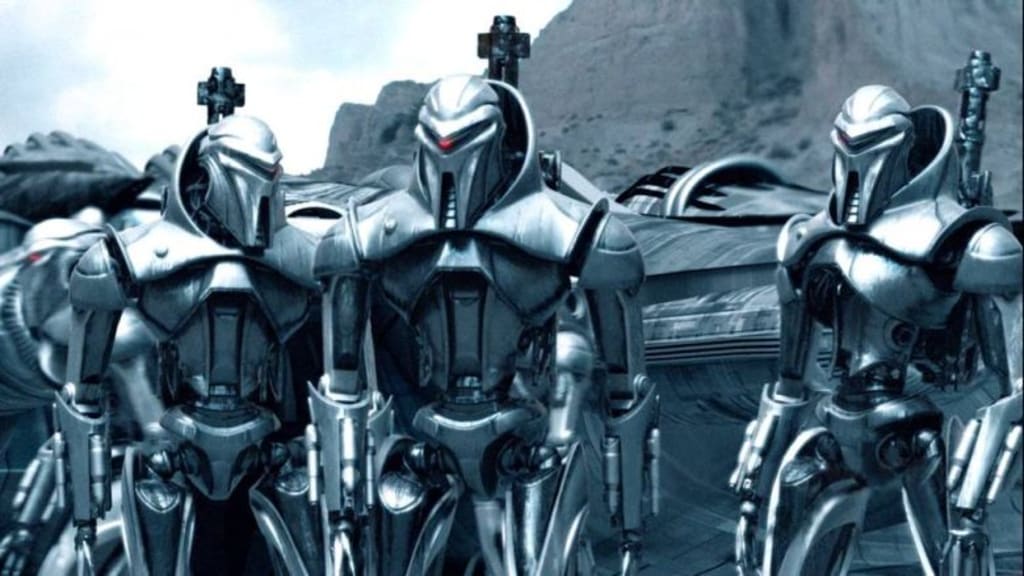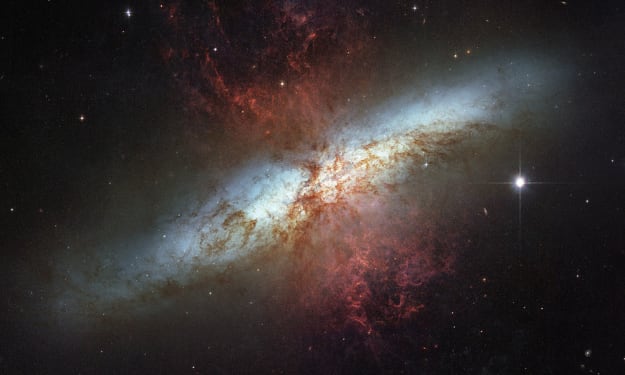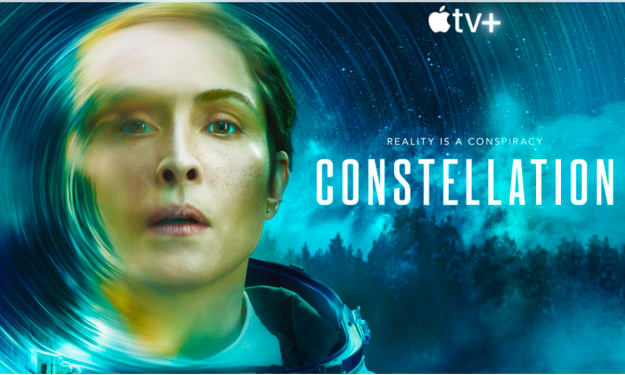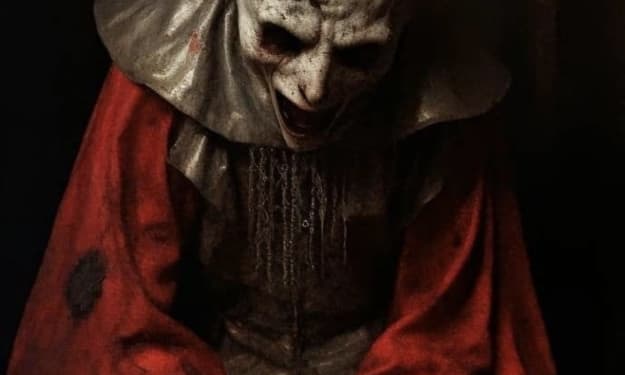So Say We All
A Neoplatonist Interpretation of 'Battlestar Galactica'

The Battlestar Galactica television series is full of rich metaphorical comparisons that would use the Platonist idea of allegorical interpretation to delve into the characters and their significance in the plot. There is also, perhaps just as prevalent, a great many Neoplatonist moral allegories in the story that leave the audience wondering the difference between right and wrong. As a television series, Battlestar Galactica broke ground as one of the most deep, philosophical shows of its time, relating on great many levels to technological dilemmas raised by authors such as Philip K. Dick and H.P. Lovecraft. Namely in the representation of its characters, the show has a number of similarities to Greek and Roman characters and motifs, such as the need to return home found in the stories of the Trojan Cycle.
Throughout the story, the rebellious robots known as the Cylons attempt to kill off the human race. The humans of the twelve core planets created the Cylons to make life easier for themselves, but they rebelled and went into hiding for forty years. In returning, the Cylons found a way to disguise themselves as humans. One of the first major moves that the Cylons make is to infiltrate a military base and blow up all of the naval vessels and kill all of the people on the twelve planets in one swift motion. One ship, Galactica, was on its retirement voyage and avoided the attack. The rest of the plot of the series is all about their journey to avenge the deaths of the human race and find a new home outside of Cylon territory. Throughout their journey, they are faced with constant obstacles, much like Oedipus and Agamemnon. Though this part of the story is not applicable to the neoplatonist moral allegory theory, it does draw a direct comparison to Greek myth and show the same struggle of heroes.
The heroes of Greek myth often shared specific qualities such as bravery, cockiness, and an undertaking of trials to prove their worth to the gods, as is the case with Heracles and Theseus. It is also notable that each of the heroes of Greek myth received guidance and support from a certain deity, ultimately helping them to achieve their goals and prolong their death. Using these characteristics, there appear to be a number of heroes within the show’s characters. The most obvious is Lee Adama, the son of the Captain and head fighter. Here, a Platonist would draw similarities of this fighting son character to Heracles, the son of Zeus. Another heroic character and perhaps the most important character of the show is Gaius Baltar. Baltar is the best scientist in humanity, however he unknowingly gave the Cylons the codes to get into the human security and kill mankind at the hands of an overtly sexual, human-disguised Cylon. After some time, he begins to see her in his head, guiding him to undertake actions of sabotage and avoiding being discovered. In a way, this is reminiscent of Athena helping Odysseus through his journey.
Neoplatonist moral allegory theory suggests that there is not necessarily an intended metaphorical comparison in stories, but that one could dig deeper to find some allegory of a conflict of right and wrong. The character of Gaius Baltar is a prime example of this issue. Baltar becomes a character of contention for the show’s viewers. They want to see him fail, believing that he is carrying out orders that are morally wrong. Throughout the series, the viewer discovers more and more that the Cylons and the humans are parallel in many ways, and that Baltar and his Cylon counterpart are acting on behalf of their respective races within each other’s minds. In other words, while the Cylon woman is in Baltar’s head helping him to find a way to peaceful cohabitation, Baltar has been appearing in her mind helping her to do the same. This is somewhat confusing to someone that has not seen the show, but it brings up an interesting point about right and wrong: the moral “wrong” may not be as wrong as you believe it to be, but may rather be a misleading step towards the moral “right.” This point is easily related to the gods of Greek myth, considering that any interaction that the gods enact in the human realm is ambiguous to the humans as to whether it is morally good or bad. The gods may do bad things with a greater good image in mind that humans will never see or they may kill someone out of spite. Greek gods interfering in human affairs often leads to death, which could easily leave humans asking if the gods have their best interest in mind.
Another moral problem that this show brings up is the over-reliance upon technology, though it would not have been a problem in Greek myth. Much of modern literature and science fiction has shown fears and warnings of technological advances going past the moral line, most notably at the point of technological sentience, or artificial intelligence. In Philip K. Dick’s short story, "I Have No Mouth and I Must Scream," he gives one of many literary examples of these fears. In the story, several characters are stuck inside of an all-knowing, all-controlling computer that overtook the humans after gaining sentience. This godlike computer, known as AM, holds the five remaining humans hostage to perpetually torture their race. A similar story, the movie 2001: A Space Odyssey shows a sentient computer of a spaceship, Hal, killing the astronauts aboard for building it incorrectly. Hal, from this movie, was known for having a single red light as a metaphorical eye, perhaps being the inspiration for the Cylons key feature, a glowing red motion detecting eye. All of these examples of technological fears bring up the primary point for a neoplatonist argument of the show: is it moral or ethical to advance technology to human sentience? Though this issue is not addressed directly in the show, since the humans have already created the Cylons and are simply trying to survive, the viewer is still forced to ponder the question. Battlestar Galactica later created a spinoff series, set in the distant past at the point of Cylon creation called Caprica. This series is far more direct in asking these ethical questions about robotic sentience.
In many ways, Battlestar Galactica shows that the fears of technological advancement are within reason; that people should be afraid of what could potentially happen. The other side of that argument is that the Cylons eventually evolve and have souls, making it possible to live together in harmony by the end of the series. Therefore, while they went through a great hardship for creating the Cylons, they also created a new form of life, albeit obscure and mechanical. The neoplatonist would argue that this story is sort of a tale of warning to future people to avoid going too far in scientific exploration, but the last episode almost makes the whole thing seem inevitable; as if it were a never-ending cycle of humanity and technology at odds with one another. Therefore, it is humanity’s job to break the cycle.
Works Cited
Ellison, Harlan, Leo Dillon, and Diane Dillon. I Have No Mouth and I Must Scream: Stories. New York: Pyramid, 1967. Print.
Tranter, Kieran. “‘Frakking Toasters’ and Jurisprudences of Technology: The Exception, the Subject and Techné in Battlestar Galactica.” Law and Literature, vol. 19, no. 1, 2007, pp. 45–75. www.jstor.org/stable/10.1525/lal.2007.19.1.45.
About the Creator
Josh Whitehead
I have a degree in Religious Studied from North Carolina State University. You will find that a lot of my work involves religion and analytical comparisons to popular culture, as these are my two favorite things. I hope you enjoy!






Comments
There are no comments for this story
Be the first to respond and start the conversation.